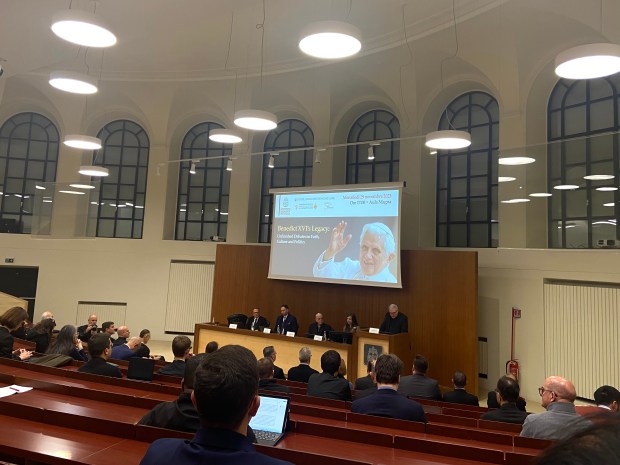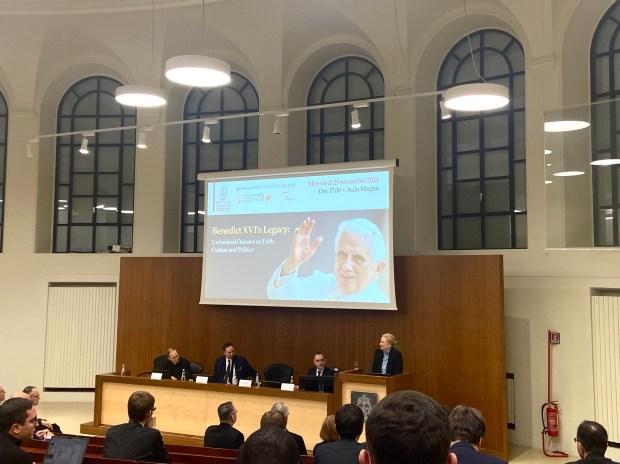Almost a year since Pope Emeritus Benedict XVI passed away, on December 31, 2022, several academic centers are joining forces to organize events to continue discussing his thoughts on issues concerning current political and cultural debates. On November 29, 2023, at the Pontifical Gregorian University in Rome, the first in a series of conferences, titled “Benedict XVI’s Legacy: Unfinished Debates on Faith, Culture and Politics,” was held to discuss Benedict XVI’s analysis of human rights by focusing on a speech he gave at the United Nations in 2008.
“As we approach the anniversary of the death of Pope Benedict XVI, indeed we continue to reflect and to become ever more aware of the importance of his cultural and spiritual heritage for the church and world of our time,” said Father Federico Lombardi, President of the Joseph Ratzinger Foundation and longtime spokesman of the German Pontiff. “The legacy of Benedict XVI remains alive and fruitful in the life of the Catholic Church.”

Continuing and deepening these unfinished debates
These conferences are organized by the De Nicola Center for Ethics and Culture of the University of Notre Dame, The Vatican Foundation Joseph Ratzinger-Benedict XVI, and the Benedict XVI Institute of Regensburg. They revolve around seven themes based on texts and speeches by the German Pontiff: human rights, the liberal democratic tradition, the foundation of justice and the natural law debate, the relationship between faith and reason, the contribution of Christianity to culture, the autonomy of science and its relationship to faith, and the Church’s response to the abuse crisis.
This first conference was based on a speech that Benedict XVI gave on April 18, 2008, at the United Nations’ headquarters in New York City, as that year was the 60th anniversary of the Universal Declaration of Human Rights, signed in 1948.
The keynote speaker at the conference was Mary Ann Glendon, a former professor at Harvard Law School and United States Ambassador to the Holy See from 2008 to 2009. She was also joined at the event by other scholars from Italy and France.
The debates continue on human rights
Glendon started her speech by highlighting that on the plane on his way to the USA in 2008, Pope Benedict XVI had reminded journalists that his visit to the UN on occasion of the anniversary of the Declaration of Human Rights was especially significant, as the world was experiencing a “crisis in values,” which is still a relevant situation today. In fact she noted that in his speech to the UN, he began by explaining his appreciation for this document before following with “the most cautionary, sober, discussion of human rights that has ever been issued from a papal pen before or since.”

Glendon explains that the German Pontiff underlined “10 threats to the human rights project,” of which she analyzed five that she believes are particularly relevant today. One threat that she explained, is how the “concept of human dignity is highly contested,” making it hard to define the foundation of human rights. Another she highlighted is how Benedict XVI’s analysis that there has been a shift from “the protection of human dignity towards the satisfaction of simple interests, often particular,” is still important today.
“Efforts seem to have steadily increased to achieve international recognition as rights for claim, that have neither broad consensus around the world nor firm grounding in international law, and that has become a major contributor to the human rights crisis,” she said.
The importance of his speech today
The other speakers at the event then went into depth on certain aspects of the text. Father Jean-Pierre Schouppe, of the Pontifical University of Santa Croce in Rome, for example, spoke about the questions surrounding human dignity and the need for Christians to engage in public debate on this topic. Professor Laurent Trigeaud of the University of Paris Panthéon-Assas instead spoke about a part in the speech that mentioned the UN’s responsibility to protect against crimes of mass atrocity such as genocide.
As US Ambassador to the Holy See at the time, Mary Ann Glendon was present when Pope Benedict XVI gave the speech at the UN in 2008. Reflecting on the standing ovation he received at the end she said she believed it was “for Pope Benedict as a global moral witness.”
“I think also […] it was in gratitude for hearing a few words of truth being spoken by someone who wasn’t there just as a representative of a sovereign entity that was his own, but who was speaking to all of humanity,” she concluded.









